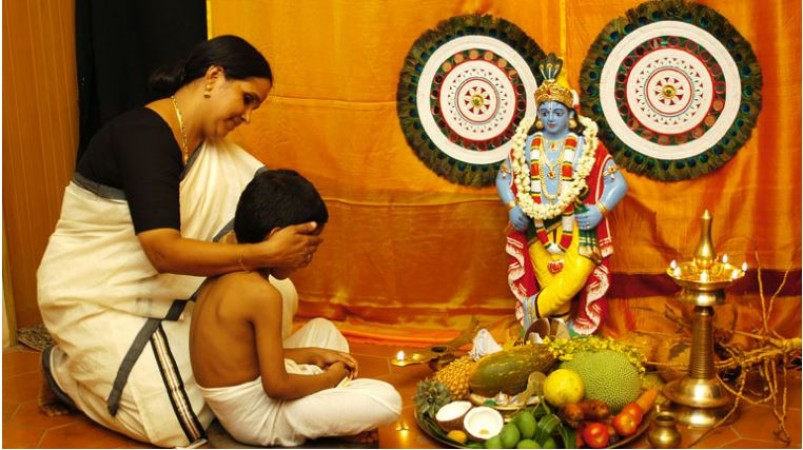
Vishu is the New Year's Day festival for Malayalees. The Vishu festival often takes place every year on April 15. In the Malayalam calendar, the first day of the month during which this event is observed is called Medam.
In Sanskrit, "Vishu" is a word that signifies "equal." And this is not simply a Malayalee event. This day is observed under several names throughout India. In Punjab, this day is known as Baisakhi, while Assames commemorate it as Bihu. In Orissa it is known as VishuaSankranti, and in Tamil Nadu it is known as Puthendu. Each state has its own distinct traditions and customs. For those who celebrate it, the Vishu festival and all other holidays that fall on the same day are immensely important.
Why is the Vishu Festival Important?: Vishukkani - In order to enjoy a tranquil and fruitful year ahead, one should witness the Vishukkani at sunrise on the auspicious day of Vishu. Vishukkani, which is also pronounced VishuKani, is a collection of numerous auspicious objects that are placed in a sizable circular vessel made of five metals and adorned with an image of Lord Krishna. These objects include fruits, grains, vegetables, lamps, flowers, coconuts, gold, mirrors, and Hindu holy books such as the Ramayana or Bhagavatgita. The puja room is where something is stored.
The golden Casia Fistula, also known as Konnappo, typically blooms only during the Vishu festival and is used in the VishuKani ritual. The primary vegetables used in the process include jackfruit, tender mangoes, and cucumbers that are golden in colour. Valkkannadi, the owner of the special mirror, utilises it, while others without it use an ordinary mirror to view it.
The evening before the Vishu day, the VishuKani is properly set. The lady of the house takes care of everything. On the Vishupulari day, seeing it as soon as you wake up is regarded as receiving the magnificent darshan of God with Vishukkani. This ceremony is known as Kanikanal.
All Malayalees place a great deal of importance on the Vishu holiday, and their preparation and celebrations make clear just how significant it is to them.
On Vishu Day, greetings are exchanged, and to mark this auspicious event, kids enjoy setting off fireworks and lighting candles. People traditionally apply chandanam or sandal paste to their foreheads before entering temples to worship.
Numerous well-known temples, like Sabarimala, Guruvayur, Sri Padmanabha Temple, etc., are crowded with worshippers on this day, and many devotees of Lord Krishna perform special pujas there.
The elders give money to the youngsters, which is a tradition known as VishuKaineetam. And different kinds of dishes are prepared in every home, called "Sadhya". These preparations consist of same proportions of sweet, sour, salty and bitter items, like mampazhapachadi, jackfruit erissery, Vishupuzukku etc.
The fact that the day and the night are equal in Kerala is still another crucial feature of this auspicious Vishu day. This explains the Sanskrit word "Vishuvam," which means "Equal Night and Day."
It is believed that Lord Krishna was killed on this day and that’s why this day is celebrated as the Lord Vishu Festival.